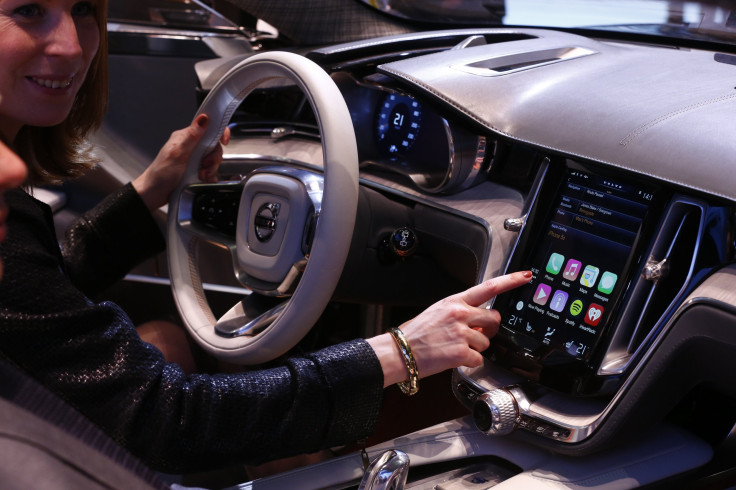Apple’s Secret Car Project: 5 Reasons Why Cupertino May Want To Build Vehicles

With the iPhone, Apple transformed the phone business. With the iPod and iTunes, it shook up the music industry. Now, the pioneering tech company may be looking to rock the automotive market. According to several recent reports, Apple has stealthily hired hundreds of employees, including dozens from the automotive industry, to work on a secret research project located somewhere outside of its Cupertino, California, campus.
The project involves development of an electric-vehicle prototype that resembles a minivan, a source told the Wall Street Journal. Code-named “Titan,” Apple’s latest project is a big departure from its lineup of computing and online products, which begs the question: What does Apple want with a car?
1. Make Money Selling Cars
It’s possible that Apple’s fixation on the car industry is straightforward – it sees an untapped market for new, innovative products. The company’s strategy of selling premium consumer electronics could translate well to autos. Apple will have the opportunity to tap into a market that saw total U.S. sales of $500 billion in 2014, according to Gene Munster, senior research analyst at Piper Jaffray. Getting even 10 percent of that could bring in upwards of another $50 billion in revenue.
While automotive research and development staff have been recruited for the new Apple project, automakers have been left out of the loop. "They don't appear to want a lot of help from carmakers," said a source speaking to Reuters.
2. Dominate In-Vehicle Infotainment
Google and Apple made their way onto millions of vehicle dashboards in 2014 via Android Auto and CarPlay, respectively. But Apple may want to go beyond that. With a car of its own, the company would control a moving platform that provides a temporarily captive audience for its vast array of content and services – from Beats to Siri.
“We’re getting to the tipping point of the software-defined vehicle,” said Thilo Koslowski, vp for automotive at research company Gartner. “It’s where Apple sees an opportunity to get linked into [the market]. By 2016, data connectivity and a connected experience in vehicles are expected to be in demand by consumers. So from a timing perspective, now is the time.” The connected-car market has lots of room for growth. Only about 10 percent of the 250 million vehicles on the road in the U.S. in 2014 carried wireless data systems, according to ABI Research.
An Apple car would also give the tech giant control of data gathered from the car, a matter raising increasing privacy concerns. Detroit came under the scrutiny of the Government Accountability Office last year for inadequately protecting location data and other information hovered up from customers’ in-vehicle systems.
3. Discover Breakthrough Mobile Technologies
Even if a physical car doesn’t emerge out of the so-called Titan project, Apple will have gained valuable information on how to expand CarPlay’s presence beyond the dashboard. After all, it’s not uncommon for Apple to research and prototype products in-house but never bring them to market. One such example is a MacBook Pro with an integrated 3G cell phone modem and antenna, which was spotted on eBay in 2011. The auction was eventually taken down after Apple lodged a complaint.
The company could also use its findings to further improve its line of mobile products, including its Apple Maps app, which it has been looking to enhance since it replaced Google Maps for iOS in 2012. Research on electric vehicles might also help Apple produce a longer-lasting lithium-ion battery for mobile devices like the iPhone and iPad.
4. Put Cash Reserve To Good Use
Apple is the most profitable and valuable company in the world -- witness its cash on hand of $178 billion. While it has tried to whittle that down through dividend payouts and stock buybacks, it may have other plans for its massive piggy bank. “They have the money to do whatever they want to do,” ABI Research practice director Dominique Bonte said. “They could even buy a car company without a problem.” One such candidate is Tesla, which angel investor Jason Calacanis predicts will be purchased by Apple for $75 billion in 18 months -- but who knows whether Tesla founder and CEO Elon Musk would actually bite.
If Apple were to tap into the electric car market, it would be entering a tiny segment of the auto industry, with only hundreds of thousands of electric vehicles sold globally in 2014. Of those vehicles, just over 31,000 were from Tesla, a company that has managed to poach 150 of Apple’s former employees.
5. Fulfill Steve Jobs’ Electric Dreams
Before Tim Cook became CEO, Apple co-founder and former chief Steve Jobs, who died in 2012, had cars on his mind. “Look at the car industry; it's a tragedy in America. Who is designing the cars?” Apple board member and J. Crew CEO Millard Drexler said in 2012, according to Cnet. "Steve's dream before he died was to design an iCar." An iCar may not have materialized during Jobs’ tenure, but Apple had certainly been exploring the possibility of what it could do in vehicles, as seen by several patents filed by the company over the years, including a dashboard patent that would eventually become CarPlay.
Apple representatives did not immediately respond to a call seeking comment on the company'splans.
© Copyright IBTimes 2024. All rights reserved.












